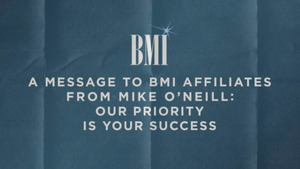The boss of BMI has issued a statement in response to all the speculation about the US collecting society's shift to becoming a for-profit enterprise and a reported imminent sale to private equity outfit New Mountain Capital.
That speculation has involved some "mischaracterisation" and "misunderstanding" according to CEO Mike O’Neill. This may be true, although he still hasn't publicly answered any of the questions put to him by a consortium of songwriter groups, which might be why people are starting to assume the worst.
BMI - which is owned by a group of broadcasters - shifted to a for-profit model last year. Most of the music industry's collecting societies around the world, including BMI's main competitor in the US - ASCAP - are member-owned not-for-profit organisations.
Debate in the songwriter community about BMI introducing a profit margin increased after Reuters reported in July that the society was considering selling itself to a privity equity outfit. Subsequent reports say that New Mountain Capital is now a preferred bidder.
Prompted by that increased debate, the Black Music Action Coalition, the Music Artists Coalition, Songwriters Of North America, the Artist Rights Alliance and American performers union SAG-AFTRA together sent a letter to O'Neill asking a series of questions about the impact of the profit margin on the commissions BMI charges on the royalties it processes; who will profit from any sale; and how having a private equity owner will change the business.
O’Neill quickly responded to that letter, but declined to answer any of the questions, instead insisting that the decisions being made by the society's board and management team are totally in the interests of its songwriter members. The same approach is taken in the statement published on BMI's website yesterday.
"There’s a lot being said recently about BMI and our future", he writes, "some of it is speculation, some of it mischaracterisation, and some that reflects a clear lack of understanding about BMI’s mission, our priority and our path forward".
Seeking to "set the record straight", he goes on: "Our mission has been and always will be to serve our songwriters, composers and publishers and grow the value of your music. This responsibility is at the very core of what BMI has always been about".
"We are the most successful performing rights organisation in the world with the highest distributions of any PRO in the world", he then brags, and that is "because we always have your best interests top of mind. We didn’t get there by simply sitting back and resting on our laurels - relying on the past has never sustained a business for the future, especially in a rapidly changing industry like ours".
This is the motivation for the big changes at BMI, he then insists. The change in business model allows BMI "to both invest in our company and grow your distributions in ways our old model prevented us from doing".
He then notes that, since the changes, BMI has been distributing more money to its members, and that it is working to "deliver even greater transparency around your royalties" and to "create new revenue opportunities to grow distributions outside of our traditional means".
"It is easy to assume that if we kept doing business the way we always had, distributions would continue to grow", he adds. "That is a dangerous assumption to make, because in an evolving industry like ours, you run the risk of settling for a larger slice of a shrinking pie. Our goal is to grow that pie to your benefit".
As for the potential sale of BMI, he continues: "While we have the resources to continue to grow our business, if we can find a partner who can help us take advantage of new opportunities and provide a new level of investment and technological expertise, then of course we would explore that".
But, he insists, "we would only consider a partner who has a proven track record of growing the companies they work with and one who would prioritise our affiliates and their financial success. Anyone suggesting otherwise hasn’t paid any attention to our history and mission".
Some have speculated that, under new private equity ownership, BMI might seek to mainly represent bigger name songwriters, rather than operating an "anyone is welcome" model.
But not so says O'Neill. "The industry’s most successful music creators didn’t start out that way, and we pride ourselves on our work helping to guide, develop and support your talent to ensure your passion can also be a profession".
Finally, he concludes: "We are excited for what’s to come. BMI has always been there for our creative community, welcoming all songwriters and composers of all genres through our open-door policy, championing our creators at every career stage, fighting for the highest compensation for your incredible music that we all love, and far beyond. All of this is at the heart and soul of BMI and will never change".
So that's all lovely. Though, some songwriters might say, it would be even lovelier if the heart and soul of BMI didn't involve repeatedly ignoring their questions.

